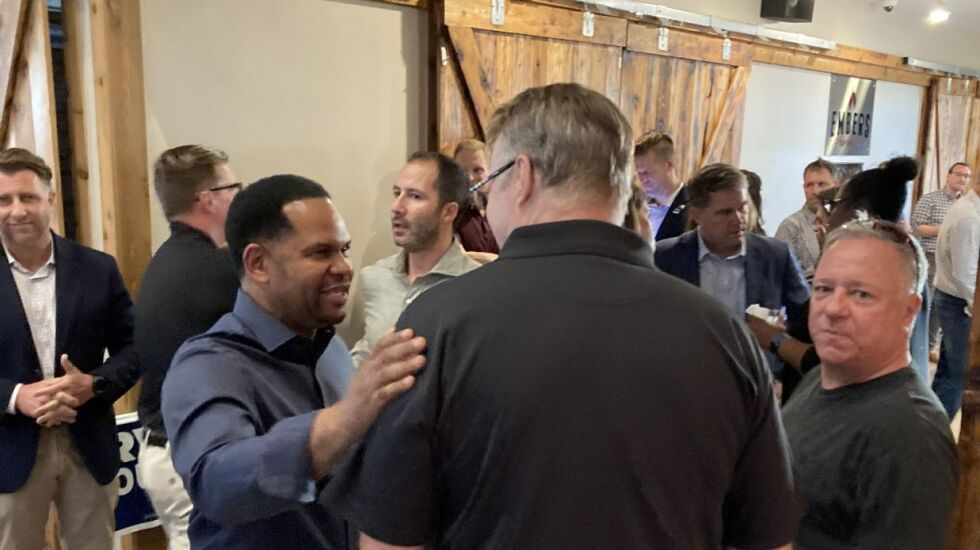
Richard Irvin’s public profile has risen dramatically because of a political war between billionaires on polar opposite sides of the ideological spectrum.
But the Republican gubernatorial primary candidate’s story is also a tale of personal success and determination — a kid who grew up in public housing and went on to fight in the U.S. Army, became a lawyer, and later, the first Black mayor of Aurora.
He’s also been a prime target for Democrats and his GOP primary opponents — a moving target they can’t always quite zero in on. He has benefited tremendously from the $45 million in campaign cash from billionaire hedge-fund founder Ken Griffin, allowing Irvin’s campaign to inundate the airwaves with attacks on Democratic Gov. J.B. Pritzker, and more recently, on his Republican opponents.
And Irvin isn’t shy about punching back, including against any suggestion that he’s hiding behind his TV ads or Griffin’s cash.
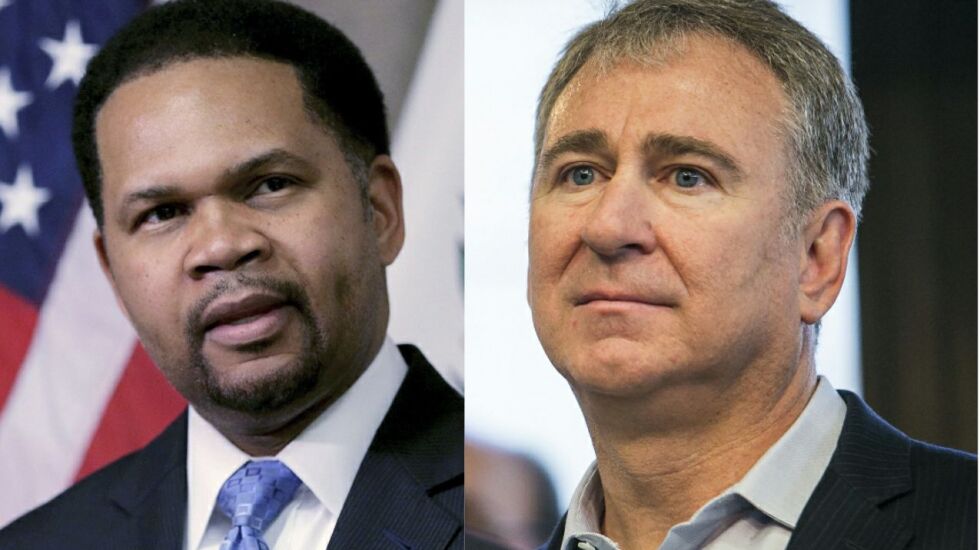
“I’m my own man,” he told the Sun-Times, calling himself “a people person” who enjoys meeting voters across the state.
But the exchanges between Irvin and his rivals are a stark reminder that the Aurora mayor is far from out of the woods in a crowded primary that includes state Sen. Darren Bailey, R-Xenia, Petersburg venture capitalist Jesse Sullivan, former state Sen. Paul Schimpf of Waterloo, Hazel Crest lawyer Max Solomon and Bull Valley businessman Gary Rabine.
‘We’ve got to do better’
The scripted man in the ad with the big scissors vowing he won’t pardon former Illinois House Speaker Mike Madigan — something no governor would be able to do if Madigan does ever face a federal conviction — was not who showed up at a campaign event in southwest suburban Lockport last week.
Instead, the Richard Irvin who met with supporters in the suburban restaurant that day exhibited a strong but comfortable stage presence and an ease with the public.
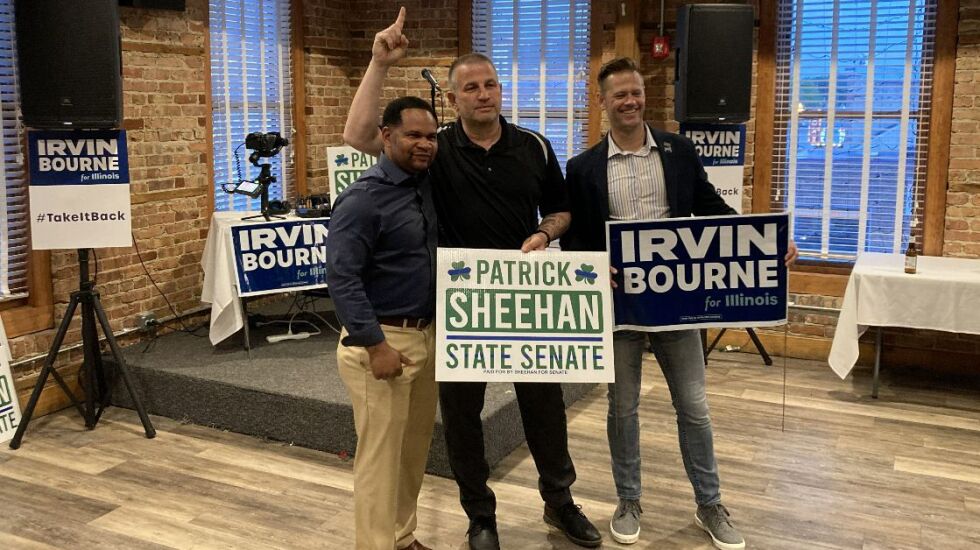
He seemed energized by his supporters, many of them police officers whom he calls his “brothers,” including Chicago Fraternal Order of Police President John Catanzara, whose union endorsed Irvin earlier that day.
“I’m living proof that America is the greatest country in the world,” Irvin told the crowd at Embers Tap House. “Illinois has given so much to me, and it’s done so much for all of us. It is the greatest state in the United States of America.
“We’ve got to do better. Enough is enough. Crime and not supporting our police. Enough is enough. With raising taxes so we can’t afford the homes we all live in. Enough is enough. With the corruption that prevents us from moving forward. We’ve got to take our state back.”
‘I travel the state weekly’
Irvin is a good in-person politician, a side of him that many in the Chicago area haven’t gotten to see so far.
For now, the primary has been largely dominated by ads and mailers — a strategy that has been working. But should the numbers get closer — an early May WGN poll showed Irvin leading by just 4.3 percentage points with a 3-point margin of error — his campaign might regret not showcasing Irvin’s abilities to speak to voters directly a little sooner.
But as his status as front-runner, albeit slim, suggests, there is a logic to the strategy.
There are some thorny issues that Irvin won’t get into on the campaign trail — to avoid alienating the state’s staunchest conservative voters. He has dodged questions about whether he supports former President Donald Trump. And he has said he’s “pro-life,” but won’t comment on the leaked U.S. Supreme Court draft opinion that could signal the end of Roe v. Wade.
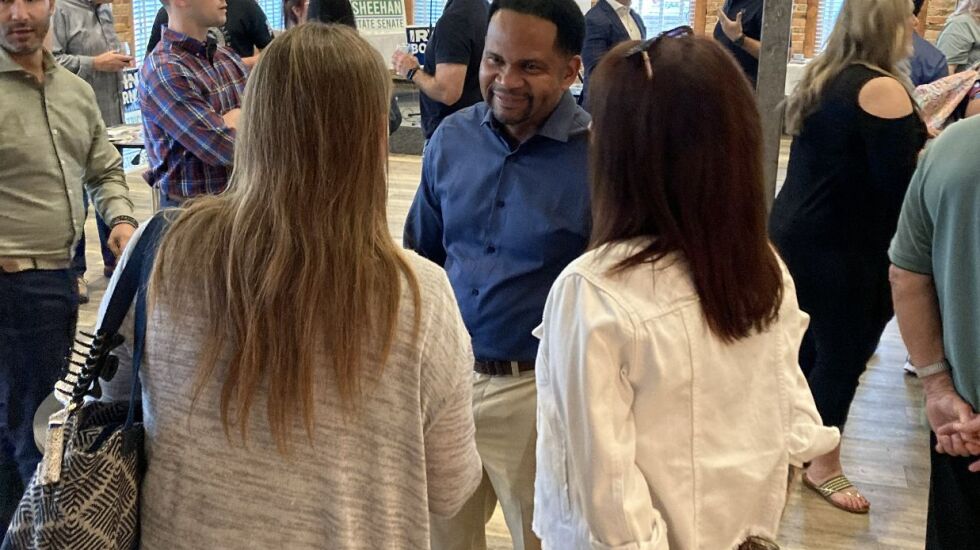
But when you ask Irvin whether he should have been talking to media and supporters sooner, he looks confused. He believes he has been spreading his message — and not just on TV and in the mail.
“I have been out doing this. I travel the state weekly. And I talk to media throughout the state,” Irvin told the Sun-Times in an interview. “In fact, I was just in southern Illinois today talking to media, but you know, Chicago media wouldn’t know about it.”
A Sun-Times reporter told Irvin the Chicago media would like to know about those opportunities, which generally are not listed on his campaign website.
“I don’t know how to tell you,” he said with a laugh. “That’s just a perception that my opponents try to draw, that I’m in some basement somewhere. I manage the second largest city in the state. I have City Council, open City Council meetings weekly. I’m on Facebook Live,” Irvin said.
“Good. If they think that’s where I’m at, the basement, then they’re behind the eight ball because, really, I’m going throughout the state and meeting as many people as I can so they can hear me speak, just like I did today, and understand what my team plans to do to move the state forward” Irvin said.
‘I like people’
For his part, Irvin said he’s aware that his ads may not translate to voters who he really is. His campaign website also offers limited information about his platform, besides his vows to fight crime, corruption and lower taxes — and his record as a two-term mayor.
“I think the best way to actually impress upon people who I am is to meet them,” Irvin said. “I like people. I’m a people person. I just like stories about people, people I haven’t even met yet. I just like people in general. ”
Irvin, 52, grew up in low-income housing with a single teenage mother, who had him when she was 16. After high school, and with the urging of his grandfather, a World War II veteran, he joined the U.S. Army and served in the Gulf War.
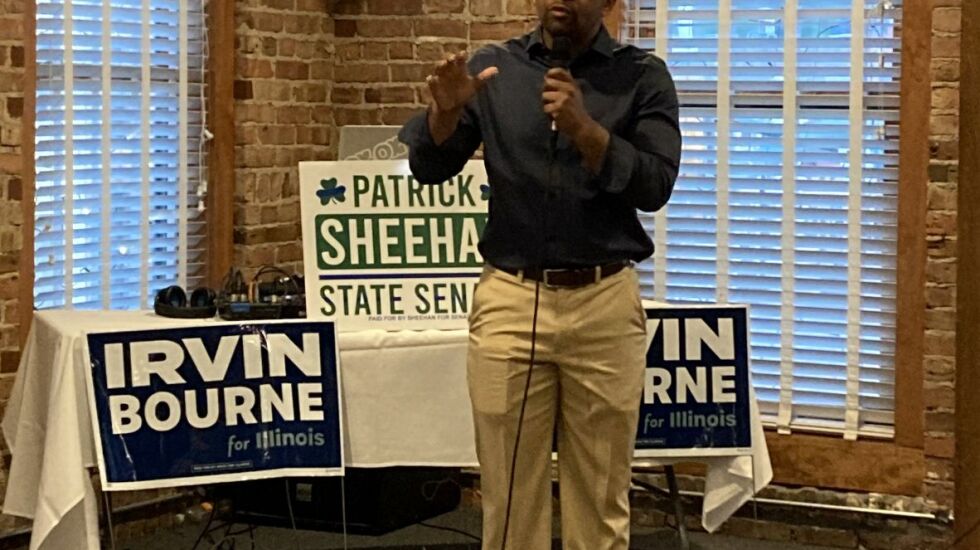
“If I tell you my story, if I tell you what we need to do for Illinois and you can feel my passion and I can inspire you, then that makes a difference,” Irvin said. “And sometimes commercials don’t relay that. They relay a little bit of who I am, but that direct person to person contact is what really does it.”
As proof of Irvin traveling of the state, his campaign referred the Sun-Times to pictures posted on the campaign’s Facebook and Twitter pages. The campaign later emailed a list of events, which included visits to 22 counties between March 7 and May 9.
But it’s a stark contrast to the way Bailey publishes his upcoming campaign events on his Facebook page, which has 107,000 followers. Irvin’s events aren’t listed on his campaign site or Facebook page, which has 3,900 followers, perhaps to keep competing campaigns out, or to control who will show up to his events. A Pritzker campaign tracker was booted from the Lockport event attended by the Sun-Times.
A “Meet Richard” tab on his campaign website features photos, his biography and an option to contribute to his campaign, but no information about public events.
‘I’ve been in open communication’
Irvin has also conducted two formal news conferences — and a round of media interviews in the early weeks of his campaign. He has since conducted several interviews with local reporters in various counties, his campaign said. He ramped up a #TakeItBack campaign tour on Thursday, May 19 — the first day of early voting, with media receiving advisories to attend three days of events across the state.
Irvin seems to have taken to heart media training about staying on message. But he has struggled in less controlled environments, such as a news conference at his Aurora campaign office earlier this month. Irvin purposefully deflected answers about abortion and Trump while repeatedly uttering “Let me finish,” to reporters who tried to get him to answer their questions. His campaign has countered that he was prepared and answered the questions the way he wanted to.
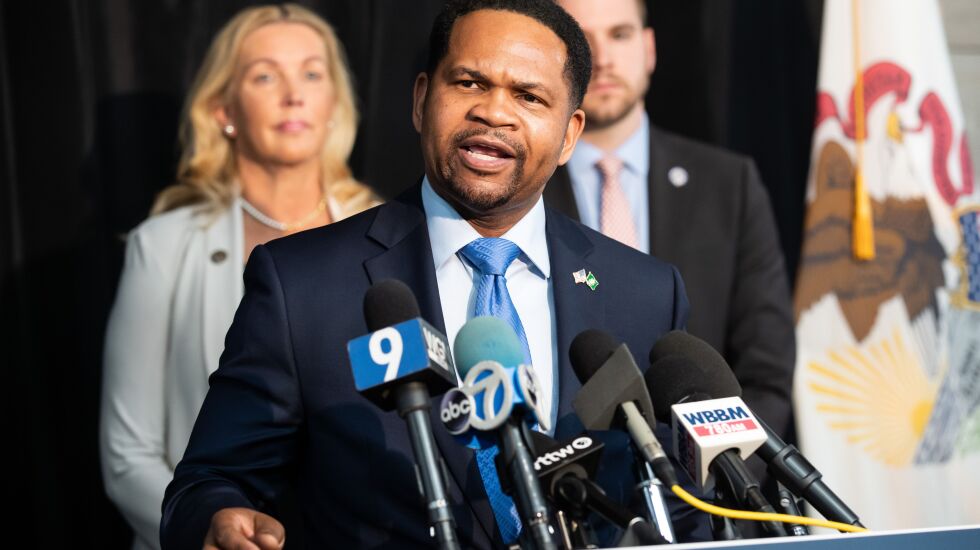
“I recognize every time I step in front of cameras, sometimes the reporters don’t want to talk about what we came in to talk about or they want to talk about other things, and I don’t have a problem with that,” Irvin said about the news conference that earned him a Sun-Times front page headline “Deflection Day.”
“As far as my communication with the media, as being mayor of Aurora for the last five years, I’ve been in open communication. Other than COVID shutting everything down, I had bi-weekly sessions with the media, just talking about things going on,” Irvin said. “And I plan on doing that as governor, as well.”
Asked whether he’d hold another news conference before the June 28 primary, Irvin offered up the “debates” he said he’d do, of which he’s only confirmed one. Pressed again on a formal news conference, Irvin said, “I’m sure we will.”
Irvin is scheduled to participate in a NBC debate at 6 p.m. Tuesday with Schimpf and Solomon. Bailey, Sullivan and Rabine will appear separately at 7 p.m. for a WGN debate. Irvin hasn’t formally accepted an invitation to a June 2 debate organized by WLS and the Illinois League of Women Voters.
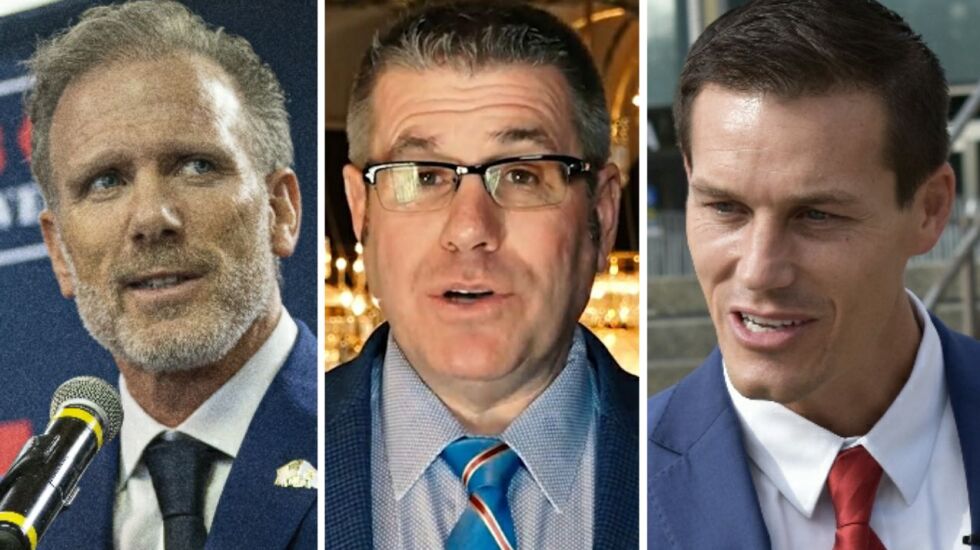
And besides editorial board endorsement sessions, which aren’t generally open to the public, Irvin hasn’t stood on a debate stage with Bailey, who is running a TV ad calling Irvin “a lifelong liberal you can’t trust.” The Irvin campaign said they have only received invites from two media outlets for editorial board sessions: the Chicago Tribune and Daily Herald.
In contrast, Pritzker, also in a crowded primary in 2018, participated in 36 forums, six debates and 10 editorial board sessions. His team says it was a way for Pritzker— a billionaire who pumped $171 million into his first campaign — to show that he was a “real person,” and it helped him talk to voters about the issues they cared about. The practice also appears to have helped Pritzker down the road, especially in dealing with the media when controversies arose.
‘I’m nobody’s pushover’
Democrats have been calling Irvin “Rauner 2.0” – after Bruce Rauner, the Republican governor ousted by Pritzker. And Irvin and Rauner do indeed share many of the same campaign staffers. And Rauner was also supported by Griffin, the richest person in Illinois.
But, unlike Rauner, Irvin said he would “absolutely” sign a budget every year despite disagreements with what could once again be a Democratic supermajority.
“I’m a Republican in a Democratic stronghold. I’ve been working across the aisle my whole political career,” Irvin said, adding he’s gone to Springfield to rally for Aurora resources “I don’t have a problem working across the aisle with those folks and making sure we get a budget every single year.”
But Irvin said he has “no” relationship with Chicago Mayor Lori Lightfoot, having first met her at a Bloomberg Harvard City Leadership Initiative for new mayors in 2019. He vowed to work with her though, if elected, the same way he’s worked with Democrats in the past.
And he unsurprisingly doesn’t agree with how she’s handling crime in the city, a focal point of his pro-police campaign platform.
“I don’t want crime and what’s going on to just chase and scare people away,” Irvin said. “I would go there and make it clear that this is the direction we have to go in and you need to work with me, period, because Chicago is too important to the state of Illinois.”
As for Griffin, his multi-million dollar benefactor, Irvin said he’s only met with him twice, and he won’t be beholden to his agenda if elected.
“I’m nobody’s pushover,” Irvin said. “I’m my own man. I always have and I always will be.”







